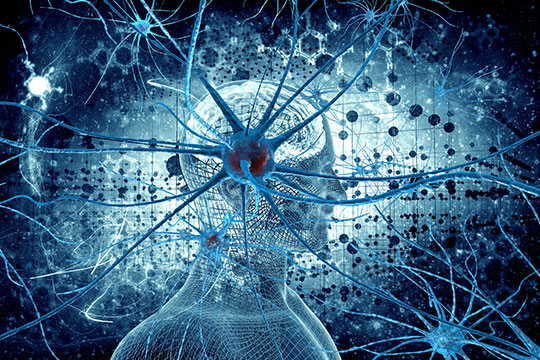
One of the most common questions we acupuncturists get is how exactly acupuncture works. Perhaps one of the biggest problems with acupuncture becoming universally accepted is in the way many practitioners explain what’s going on when you have acupuncture. Some will give you a convoluted explanation and talk about the flow of energy, Qi, and balancing your energy pathways. While these descriptions may be accurate within the context of Chinese medicine, it is not helpful to the prospective patient who wants to know if acupuncture will help relieve their back pain or reduce the incidence of their migraines.
The real issue is that practitioners of Chinese medicine are working from a different paradigm than that of Western medicine—a different set of beliefs as to how your body works. This isn’t a bad thing, it’s just…different, and explaining how this medicine works from one paradigm to another can feel confusing. It’s true that acupuncture and much of what we know about Chinese medicine is energetic in nature. And while these explanations may sound like new age gibberish, remember what you learned in 8th grade biology class, which is that every cell in your body makes energy. The “mighty” mitochondria in each cell generate energy that your body needs to perform every physical function and to maintain health.
This isn’t so far off from the Chinese explanation, in that your energy, also known as Qi, has to be abundant for your body to function healthfully. Everything from immunity to digestion and conscious thought is happening because you have enough energy to make it happen. A second energetic concept according to Chinese medicine is that your energy needs to flow. When it doesn’t you get painful accumulations that are the source of many symptoms and illnesses. For example, many people carry their stress in their upper back and shoulders. As those muscles get tight, it hampers the circulation of blood and energy in the area. Over time, those tight muscles and lack of flow become the stuff of headaches, achy muscles, and stiff necks.
If you were to go to your Western doctor and talk about energy, he or she would probably be thinking about vitality or fatigue. However, while your doctor may not understand the energetic properties of Chinese medicine, they are very real and far-reaching. A large body of research has given us a scientific understanding of the physiological effects of acupuncture.
Here is a rundown on how acupuncture works according to a Western biomedicine, based on volumes of research:
- Acupuncture promotes your body’s ability to heal. The process of acupuncture creates tiny injuries, or microtraumas, to your body. These microtraumas actually stimulate your body to heal tissues through the nervous system, immune system, and endocrine system. So as your body goes about healing the tiny punctures, it also promotes healing in the surrounding tissues.
- Acupuncture reduces inflammation. Research has documented an increase in the concentration of inflammation-fighting white blood cells around a needled acupuncture point by about 40 percent. This is why your practitioner will frequently place needles at or near where you are having the most pain.
- Acupuncture alters your brain chemistry in a way that reduces pain. An acupuncture session causes your body to increase the circulation of opioid-like pain-killing chemicals, some of which are far more potent than morphine.
- Acupuncture restores homeostasis. This is your body’s ability to regulate systems and maintain internal balance—everything from temperature to your ability to convert food into nutrients. Disease occurs when homeostasis is disturbed, and it is understood that acupuncture’s ability to promote healing is through the rebalancing of your body’s internal systems.
- Acupuncture improves your body’s circulation. This increase in the flow of blood means that oxygen, nutrients, and hormones circulate more freely, along with components of your immune system that help fight infection and decrease inflammation.
- One of the most important and perhaps least known benefit of acupuncture is that it helps to relieve stress. This is crucial to good health because stress activates your sympathetic nervous system, which is responsible for your body’s fight or flight response. When you’re stressed, your body ramps up to handle the immediate threat at hand, but slows down systems that aren’t needed in the moment, like digestion and immunity. The fight or flight response is great for short-lived circumstances, but if activated for a long time can negatively impact your health.
Acupuncture stimulates your parasympathetic nervous system, which is the opposite of the fight or flight response. It’s also called the rest and digest system. When you are calm, or at least not stressed out, your digestion and immunity come back online. However, a suppressed parasympathetic nervous system can be responsible for a whole host of health issues, from digestive problems, inflammation, and autoimmune diseases.
The stress relief benefits of acupuncture also have a direct and immediate impact on your body. It can relax tense muscles, which relieves pressure on your joints, ligaments, and tendons. In addition, relieving stress can decrease the triggering mechanism for conditions such as headaches and digestive upsets. Decreased stress also translates into less inflammation and less aggravation of pain or health conditions.
The bottom line is that your body is programmed to heal, but sometimes it needs a little boost. Acupuncture can provide that boost in the form of reducing inflammation, relieving pain, relieving stress, and restoring your body’s natural state of good health.

Cindy Chamberlain is an acupuncturist in Overland Park, KS and the founder of Eastern Healing Solutions, LLC. She is licensed in Kansas and Missouri and has been practicing traditional Chinese medicine since 1996.
